 Fighters of Lanzhou MAC in confrontation training
Fighters of Lanzhou MAC in confrontation training
 3D printing to trigger third industrial revolution
3D printing to trigger third industrial revolution
 Top 10 brands that win rich women's hearts
Top 10 brands that win rich women's hearts
 Deng Xiaoping: 'I have a clear conscience all my life'
Deng Xiaoping: 'I have a clear conscience all my life'
 Xi Jinping: 'The people are our strength'
Xi Jinping: 'The people are our strength'
 Amazing cliff diving in cold winter
Amazing cliff diving in cold winter
 Enjoy Sochi 2014 in slow motion
Enjoy Sochi 2014 in slow motion
 University student sentenced to death for poisoning roommate
University student sentenced to death for poisoning roommate
 Chinese lunar New Year celebrated in San Francisco
Chinese lunar New Year celebrated in San Francisco
MOSCOW, March 4 -- Current Russian troop movements in Ukraine's autonomous republic of Crimea was nothing unusual and could not be described as aggression, a Russian military expert said Tuesday.
Moscow had a right to deploy up to 25,000 troops in Crimea in line with agreements signed with Kiev as long ago as the mid-1990s, and currently there were only 18,000, Vladimir Kozin, chief of the advisers group to the director of the Russian Strategic Research Institute, told Xinhua in an exclusive interview.
"Those troops have been deployed there long before the recent events. And they may legally stay there until 2042. So they pose no threat to Ukraine," said Kozin, who is also a Russian Academy of Military Sciences professor.
All Russian troops deployed in Crimea were attached to the Black Sea Fleet, in accordance with agreements signed between Moscow and Kiev following the breakup of the Soviet Union, the expert said.
According to the agreements, Russia has a right to move its personnel between its coastal facilities, for example from Kerch to Sevastopol in Crimea.
Kozin said the legal status of Russian troops in Crimea had been restricted to protection and servicing of the Black Sea Fleet stationed in the peninsula, adding they could not occupy any facilities not belonging to the fleet's infrastructure.
"Until recently, no frictions have ever appeared between Russian and Ukrainian military personnel. They used to hold joint drills and military parades, and participate in anti-terror operations," Kozin said.
Russian troops in Crimea could only use their weapons if they were attacked by the Ukrainian regular army, "that is, the people in military uniform," the expert said, adding attacks by paramilitary units or armed mobs would give the Russian troops a right to open fire.
Kozin said direct confrontation between Russian troops and Ukraine's regular armed forces was unlikely, but Russian troops in Crimea had to carry arms now for their own protection against possible attacks from armed mobs.
Western sanctions against Moscow would not affect its determination to protect Russian interests in Crimea, Kozin said, adding "Russia is free to impose symmetrical sanctions in retaliation. So the West and Kiev ought to think twice before taking these irresponsible steps."
The Ukrainian crisis, which originated from protests against President Viktor Yanukovych's decision last November to put on hold an association agreement with the European Union to get Russian aid, took an abrupt turn in the past two weeks, following bloody clashes between protesters and police. Yanukovych was ousted by the parliament and fled to Russia.
The mostly Russian-speaking Crimea is now the epicenter of the ongoing crisis. Some 50 armed men carrying Russian navy flags took control of two airports in the Crimean capital of Simferopol on Friday, one day after gunmen seized the local parliament and government buildings.
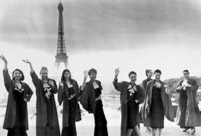 Old photos: Precious moments in Sino-French ties I
Old photos: Precious moments in Sino-French ties I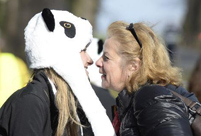 Belgians warmly welcome arrival of China's giant pandas
Belgians warmly welcome arrival of China's giant pandas Photos: Top 10 pure beauties in showbiz
Photos: Top 10 pure beauties in showbiz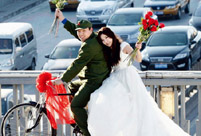 Chinese Dream: the Chinese Spirit and the Chinese Way
Chinese Dream: the Chinese Spirit and the Chinese Way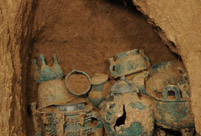 51 bronze sacrificial utensils unearthed in Shaanxi
51 bronze sacrificial utensils unearthed in Shaanxi Most gorgeous female celebs in Chi-pao
Most gorgeous female celebs in Chi-pao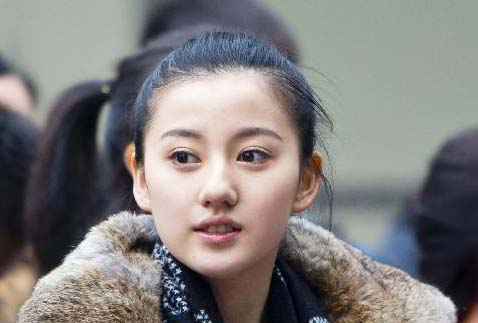 Second round of test kicks off at Beijing Film Academy
Second round of test kicks off at Beijing Film Academy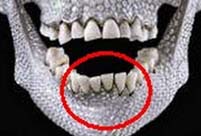 Ancient Qiang people had vertically grown teeth
Ancient Qiang people had vertically grown teeth Top 10 Chinese youth’s favorite seaside destinations
Top 10 Chinese youth’s favorite seaside destinations Sacrificial altar unearthed in China's Shannxi
Sacrificial altar unearthed in China's Shannxi Chinese warplanes C919 to appear at Singapore Airshow
Chinese warplanes C919 to appear at Singapore Airshow North China Sea Fleet conducts anti-submarine drill
North China Sea Fleet conducts anti-submarine drill Ruins of Shang Dynasty's structure unearthed in Shaanxi
Ruins of Shang Dynasty's structure unearthed in Shaanxi  Stunning figure skating in Sochi
Stunning figure skating in Sochi Intercity high speed train in operation
Intercity high speed train in operationDay|Week|Month